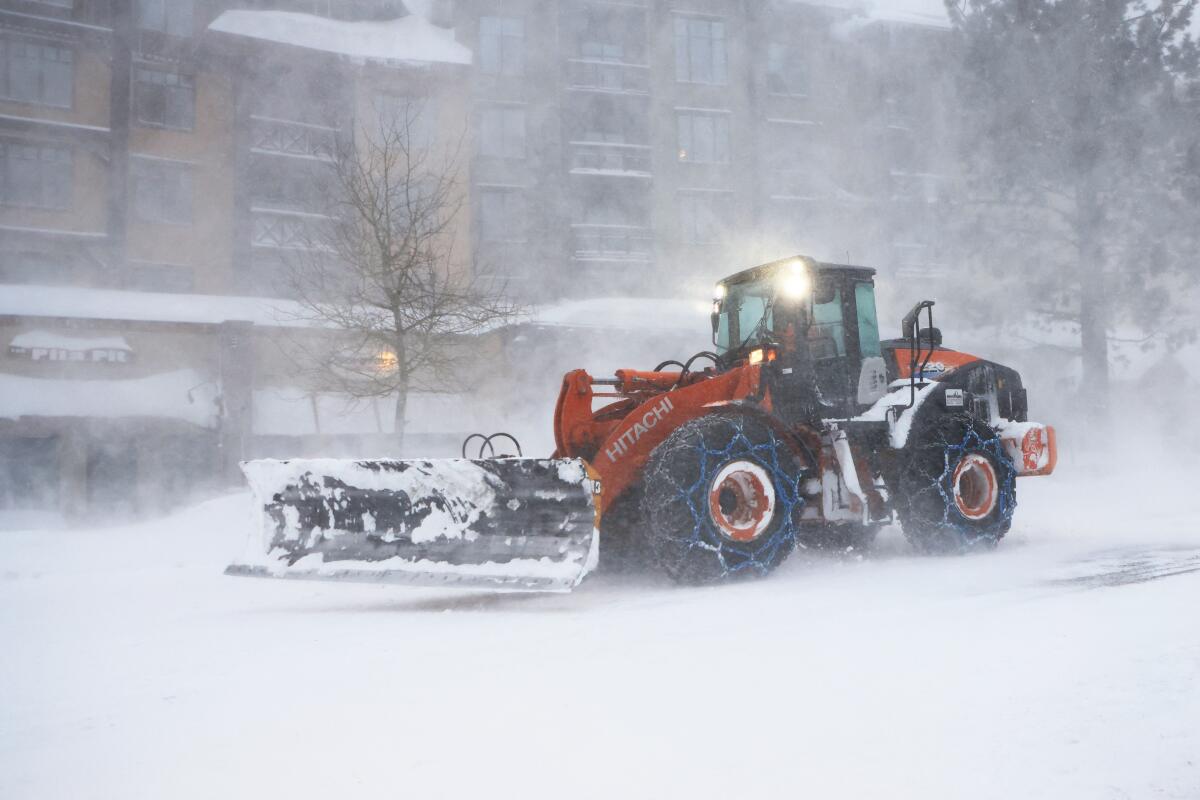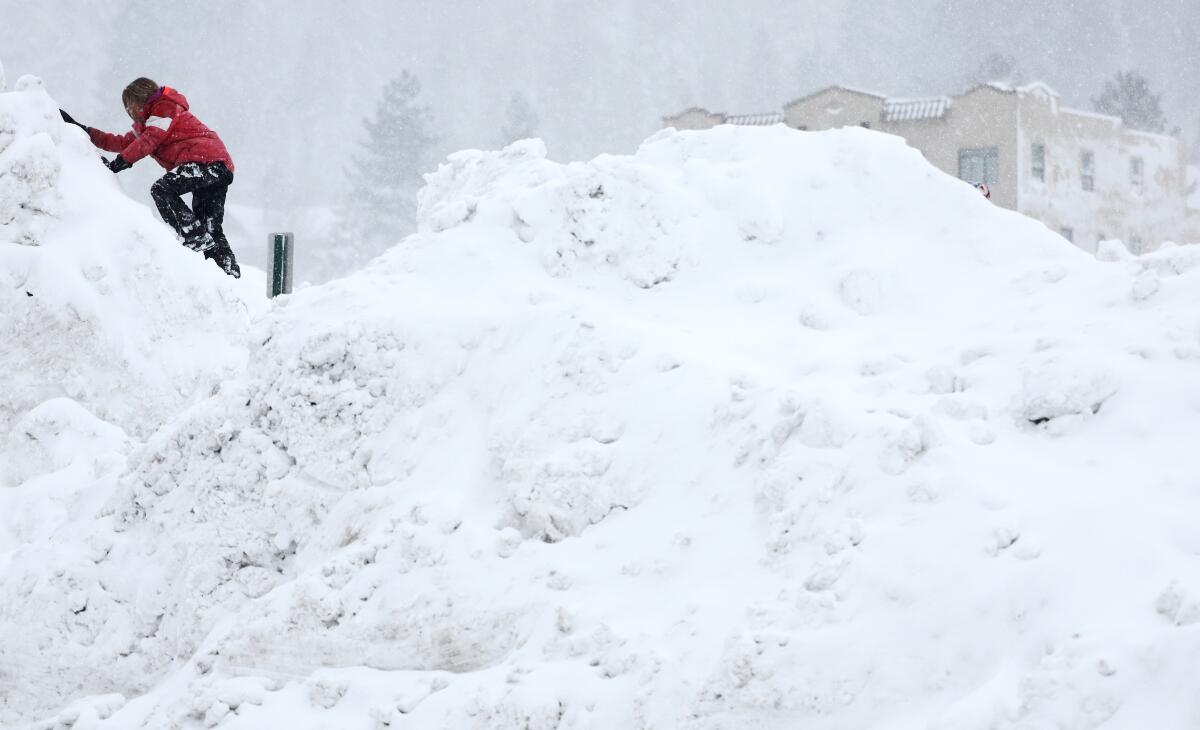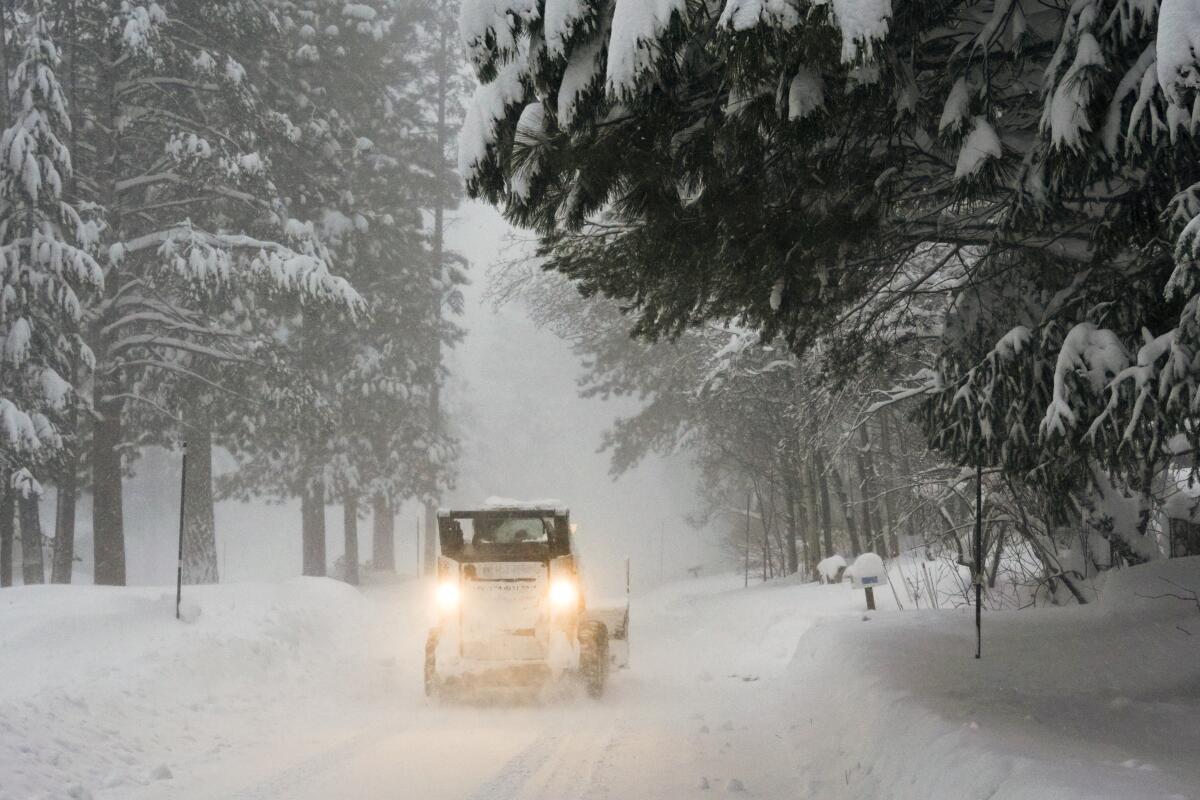Powerful California blizzard shuts roads to Tahoe, Mammoth; 190-mph winds reported

The most powerful California blizzard of the season pounded the Sierra Nevada with gusts of up to 190 mph, while heavy snow Saturday forced the closure of key roads to the Lake Tahoe and Mammoth Mountain areas.
For many hours Saturday, the main road to Mammoth Mountain ski resort, U.S. 395, was shut down in both directions — to the south, toward Southern California, and to the north, toward Reno. The 75-mile stretch was closed from just northwest of Bishop in Inyo County to Bridgeport in Mono County, “due to multiple spinouts and collisions, as well as whiteout conditions,” the California Department of Transportation said. By late Saturday, the road to the south was reopened, but remained shut to the north.
At 6 a.m. Saturday, Mammoth Mountain Ski Area reported it had received almost 2 feet of snow in some places. Two hours later, the resort said it was closing down for the day because of “extremely strong winds and blizzard conditions.”

Heavy snow removal equipment rolls as a blizzard hits Mammoth Lakes in the eastern Sierra Nevada of California on Saturday.
(David Swanson / Getty Images)
A 50-mile stretch of Interstate 80 was shut down Friday afternoon over the Sierra, which was extended to a 75-mile section by Saturday morning, between Colfax and the Nevada state line. I-80 was still closed in both directions Saturday night.
The Caltrans office in Kingvale, about 12 miles west of Truckee, has lost power, leading to the failure of its cameras and message boards.
“At this point, we are only allowing first responders and Caltrans employees on I-80. No essential big rigs, no ski resort employees,” Caltrans said on social media.
The highway was a mess. At one point overnight, “we had a mass amount of vehicles over Donner Summit and it took several hours for emergency vehicles and tow trucks to reach motorists,” the California Highway Patrol office in Truckee said Saturday morning.
“At one point, emergency personnel and tow trucks had a difficult time getting to motorists due to blizzard conditions,” the CHP said. Crews worked on removing vehicles abandoned on Interstate 80 after motorists were rescued.
A day earlier, multiple vehicles spun out and a big rig jackknifed.
“We suggest you stay home,” the CHP said. “Stay warm and don’t put yourself and your family in a dangerous position.”
On Highway 50, which connects Sacramento and South Lake Tahoe, cars spun out, forcing traffic to a standstill. A section of Highway 89 at Emerald Bay has also been shut, blocking the roadway that connects South Lake Tahoe and Tahoe City on the lake’s western shore.
A gust of 190 mph was detected Friday night at Palisades Tahoe at an elevation of 8,700 feet, according to the National Weather Service. Forecasters warned of extreme avalanche danger across the Tahoe region in the Sierra backcountry through Sunday afternoon.
Around Mammoth Mountain in Mono County, peak winds clocked in at 114 mph Friday afternoon.
The record in California for the fastest wind gust verified by the National Oceanic and Atmospheric Administration was 199 mph on Feb. 20, 2017, at Ward Mountain, also known as Ward Peak, at Palisades Tahoe.
Forecasters urged people to stay where they are unless there’s an emergency, and warned that it could take time for plows to dig out communities. Meteorologists say the storm, which could dump up to 12 feet of snow in the highest elevations of California’s mightiest mountain range by Sunday, might result in one of the top 10 snowiest days of the central Sierra since 1970.
“Conditions in the Sierra will be treacherous through Sunday morning with life-threatening travel,” the weather service said.

A child plays on a snowbank as snow falls north of Lake Tahoe on Saturday during a powerful multiple-day winter storm in the Sierra Nevada in Truckee, Calif.
(Mario Tama / Getty Images)
The crest of the Sierra overall is expected to get 6 to 10 feet of snow; Mammoth Lakes, 2 to 4 feet; and the Tahoe Basin, 3 to 6 feet. Snow has been falling steady at about 2 inches per hour, with intermittent rates of 3 to 4 inches per hour, the weather service said, which should peak late Saturday.
The UC Berkeley Central Sierra Snow Lab had received 3 feet of snow by Saturday morning, and expected several more feet by Monday morning.
Mammoth’s ski resort forecast a high of 15 degrees Saturday and, besides the blizzard, forecast “thundersnow,” in which lightning can occur within a snowstorm.
“Light, fluffy snow will be easily blown around, creating whiteout conditions with near-zero visibility at times,” the weather service office in Reno said. For those who do venture out, “pack an emergency kit and prepare to be stranded in your vehicle for an extended period of time.”
Sophie Abadilla at Footloose Sports, a ski shop in Mammoth Lakes, said she had been forced to walk to work rather than drive because of the storm. Although the town usually quickly clears sidewalks during storms, she still had to trudge through more than a foot of snow, she said.
With the ski resort closed Saturday, the shop was busy with tourists, Abadilla said. “They say, ‘We’re tired of staying in our hotel room watching the same movies.’”
At the same time, local residents were avoiding shopping or even going out because of the dangerous conditions. “We just want to stay home,” she said.
Despite the storm, the Mammoth Film Festival scheduled through Monday continued with its schedule, said Tanner Beard, the event’s co-founder.
Caltrans workers assisted, Beard said, when some people expected to work at a festival event got stuck in Bishop and were able to follow behind snow plows up the mountain to get to Mammoth Lakes.
Beard said it was the third blizzard to hit at the time of the annual film festival in the last six years.
“Nothing will stop filmmakers,” he said. “The show must go on.”
The rare blizzard warning issued by the National Weather Service office in Reno will last through Sunday morning. The blizzard warning extends from Lassen Volcanic National Park in Shasta County to Kings Canyon National Park in Fresno County.
Blizzard warnings for the Sierra Nevada are typically issued about every other year.
There should be a bit of a lull starting Sunday morning, but there will still be chances of snow showers that will continue into Wednesday, the weather service said, especially for the Sierra north of Highway 50. Drier weather is expected after that.
Thousands of customers in the Tahoe area were without power Saturday, according to the Truckee Donner Public Utility District and Liberty Utilities.
Other areas of California are also forecast to be affected by the strong winter storm. A stretch of Interstate 5 in Siskiyou County, near the Oregon border, could get more than 1 foot of snow.
And Highway 101 in Mendocino, Humboldt and Del Norte counties could see snowfall. Highway 101 at Ridgewood Summit in Mendocino County could get up to 1 foot of snow; at Prairie Creek Summit in Humboldt County, up to 1.5 feet; and south of Crescent City in Del Norte County, about half a foot of snow.
Yosemite National Park was ordered shut down starting Friday and its visitors told to leave by noon. The park will remain closed at least through noon Sunday, and its closure could be extended.
Some 6 to 12 inches of snow could fall in Yosemite Valley — the most popular part of Yosemite National Park, the National Weather Service office in Hanford said. A winter storm warning was in effect through Sunday morning.

Snow is cleared from a road during a storm Saturday in Truckee, Calif.
(Brooke Hess-Homeier / Associated Press)
A more intense blizzard warning was already in effect for the rest of Yosemite National Park outside of Yosemite Valley, which will last through Sunday morning.
Some 2 to 3 feet of snow could fall at the Big Oak Flat entrance to Yosemite National Park along Highway 120, a route often taken by travelers from the San Francisco Bay Area.
Along Highway 41, a route to the park often taken by those from Fresno and Southern California, 3 to 5 feet of snow could fall at the entrance to the park, around Mariposa Grove. At the historic Victorian-era Wawona Hotel, 3 to 6 feet of snow could fall.
The winter storm was expected to be more mild for Southern California. The wettest period of the weekend was expected Saturday, but there’s still a chance of rain Sunday.
Still, there could be “isolated and brief bursts of heavy rain likely through Saturday night,” mainly in the foothills and coastal slopes, the weather service office in Oxnard said. There is the potential for mudslides and rockslides on canyon roads and below steep hillsides, and ongoing land movement in recent landslide areas.
For the weekend storm, downtown L.A. could get 0.6 of an inch of rain; Long Beach, 0.44 of an inch; Pomona, 0.74 of an inch; Pasadena, 1.33 inches; Santa Clarita, 0.77 of an inch; Oxnard, 0.65 inch; and Santa Barbara, 0.92 of an inch.
San Diego could get up to 0.2 of an inch; Irvine, San Clemente and Riverside could get up to 0.3 of an inch; Anaheim, up to 0.4 inch; Ontario and Temecula, up to 0.7 of an inch; and San Bernardino, up to 1 inch.
The San Francisco Bay Area encountered thunderstorms Friday night, and more rain arrived Saturday. Cities in the Bay Area were generally forecast to get between 1 and 1.5 inches of rain through Sunday.
Four people were hurt in San Francisco on Friday evening when a tree fell on their car at Golden Gate Avenue and Laguna Street, firefighters said.
Share this news on your Fb,Twitter and Whatsapp
Times News Network:Latest News Headlines
Times News Network||Health||New York||USA News||Technology||World News